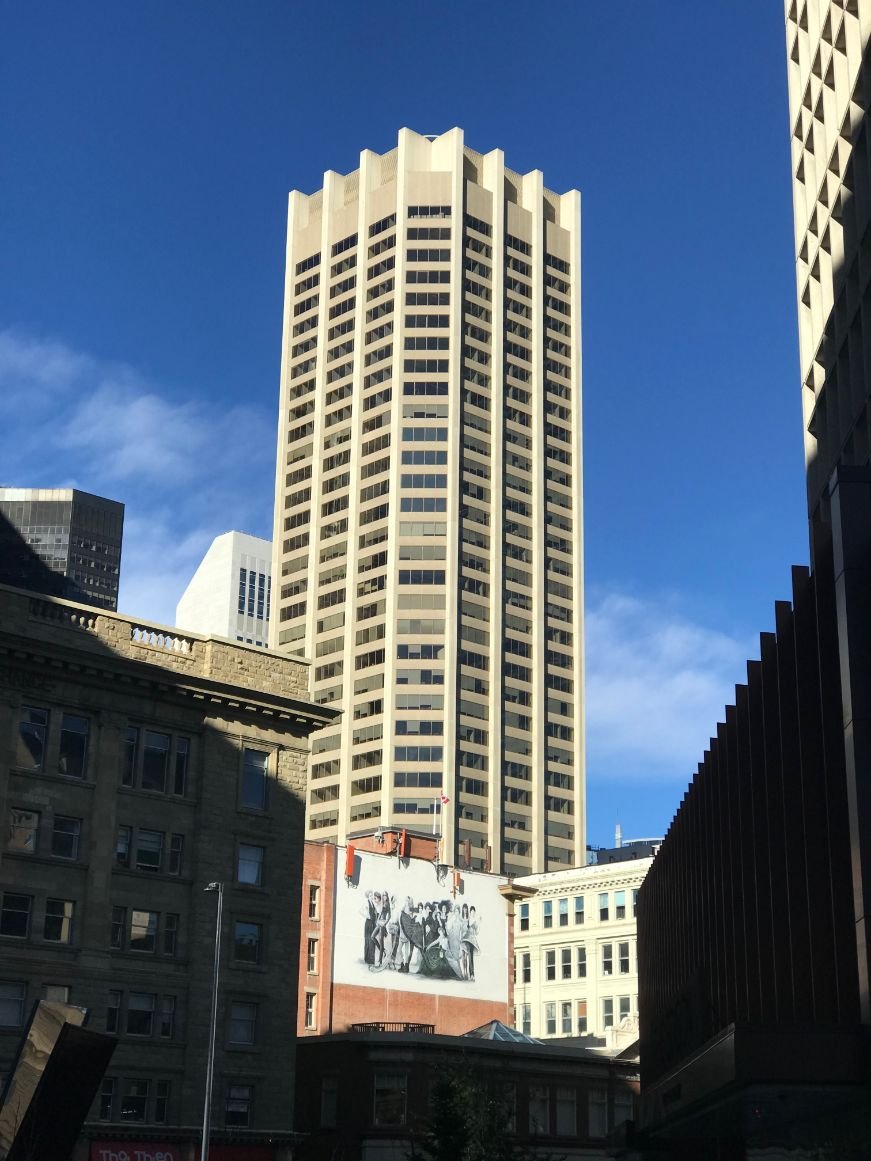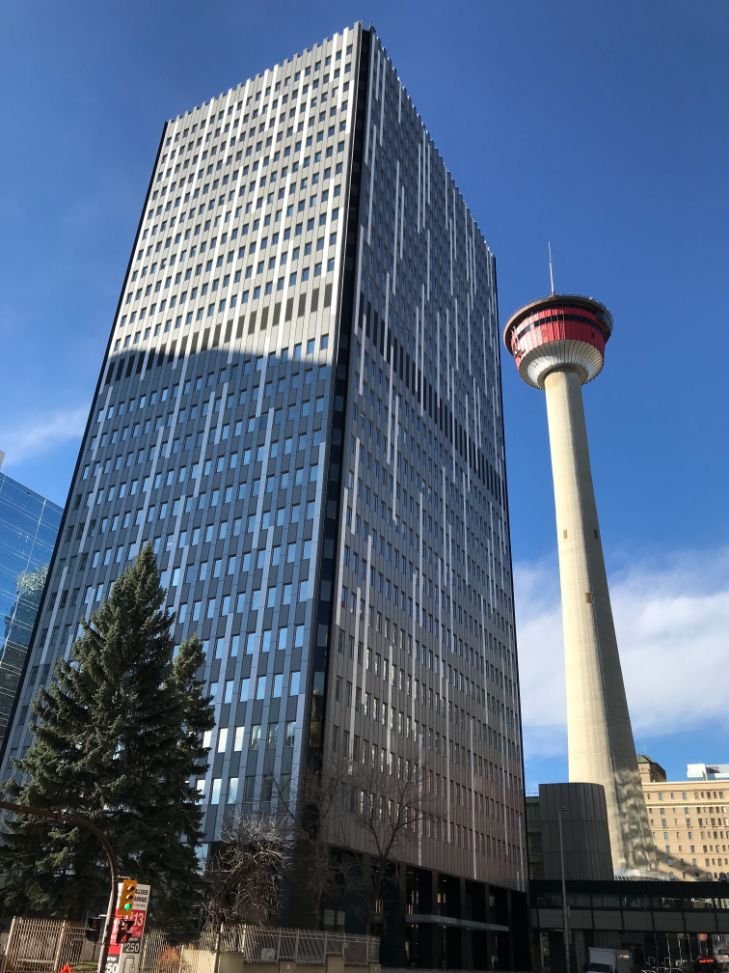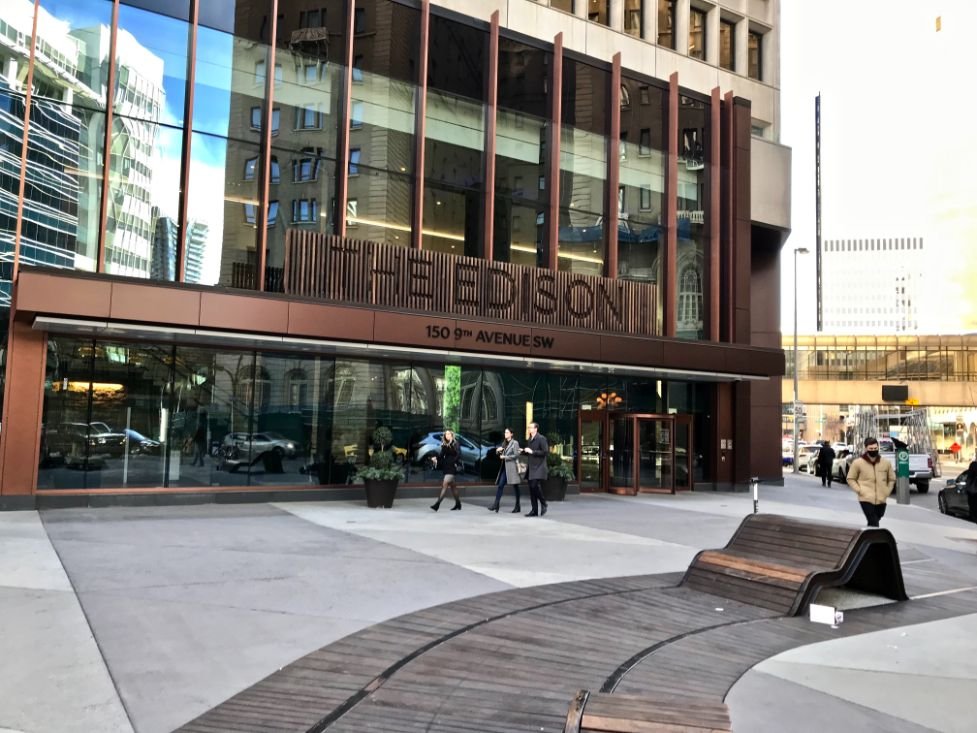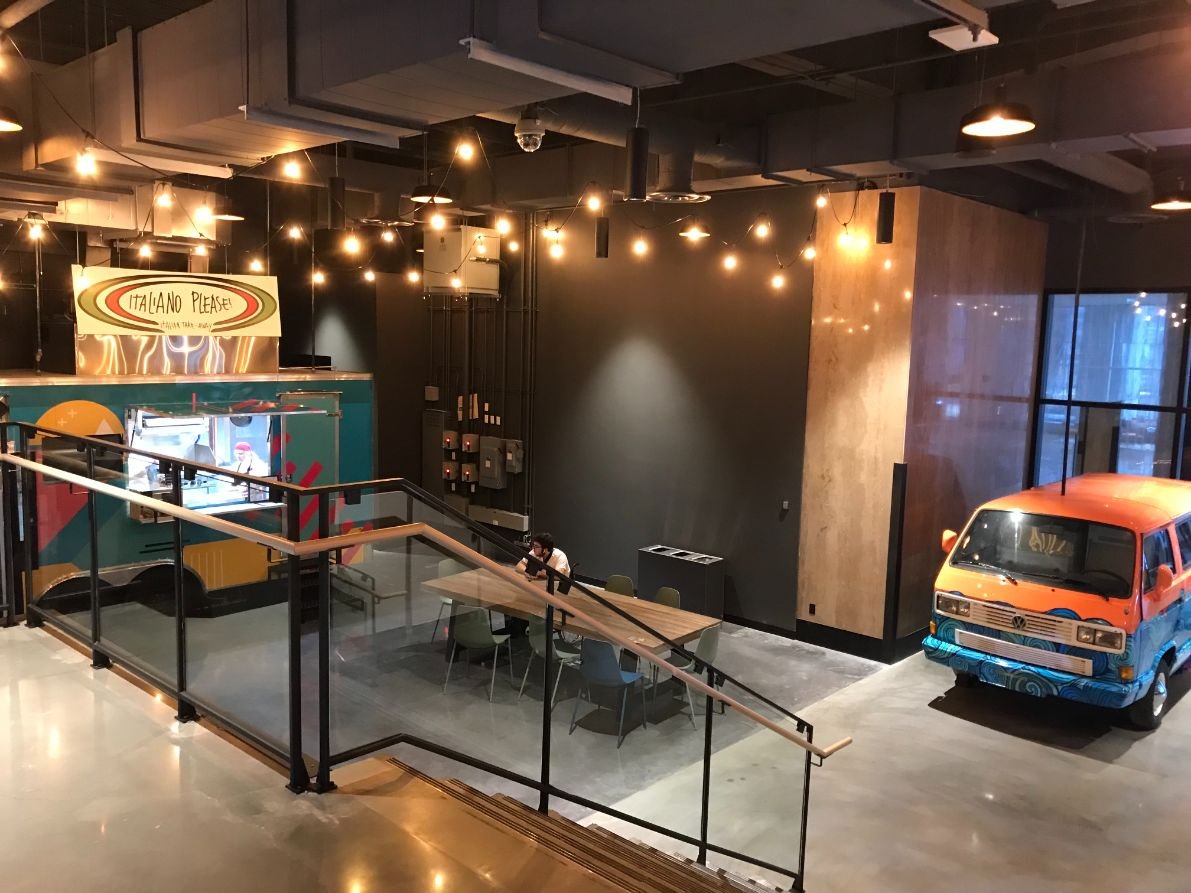5 Downtown Calgary Office Towers Converted From Corporate To Playgrounds
While most of the downtown chatter these days is about converting empty, office buildings to residential and other uses, five mid-century office towers have been quietly converted from buildings suitable for large headquarter office spaces, to one’s more attractive to small, start-up tenants.
The lobby of old AGT/Telus building has been renovated to create huge rumpus room for tenants.
Instead of one major corporate headquarters taking 300,000+ square feet of office space as they did in the olden days, building owners are now looking for dozens of start-ups and small business wanting 15,000+/- square feet.
The goal of each conversions was to make the buildings attractive to young entrepreneurs by adding amenities that converted the building into a contemporary fun place to work and play.
Individual lunch rooms have become communal lounges, more like an upscale private café than a cafeteria.
Board rooms tables have been replaced with pool and foosball tables. And parkades today have as many bikes in them, as pick-up trucks.
The five oldies are: Palliser One (1970), Scotia Tower (1976) is now Stephen Avenue Place; the former AGT then Telus Building (1980) now First Tower; Pan Canadian Tower (1981), now known as The Edison and Sun Life Plaza Towers (West, North, East) built in 1981, 1982 and 1984 respectfully, have been rebranded as The Ampersand. FYI Ampersand is the name of the “AND” sign character on the keyboard i.e. “&”).
Yes, they have been stripped of their corporate names.
In an ideal world, only one of these towers would have been converted from a corporate to a creative tower, so it could more quickly become home to dozens of small creative enterprises creating in synergies between the heterogenous enterprises and animated the building.
Unfortunately on a recent visit to each of them, they feel more like ghost towers today. Hopefully this will change over the next year as the impact of COVID declines, and Calgary’s reputation as a tech hub improves.
Note: An edited version of this blog was published by CBC Calgary titled: Hot desks, beer halls, foosball and more: 5 old downtown office transformed to entice smaller startups.
Pan Canadian Tower now The Edison
Scotia Tower now Stephen Avenue Place
Palliser One with new facade, same name.
AGT Tower now First Tower.
Sun Life Plaza consists of three towers, now called Amperstad.
The Edison (northeast corner of 9th Ave and 1st St SW, 437,00 SF)
The first corporate to creative office conversion was of the old Pan Canadian tower by Aspen Properties – rebranded as the Edison. This 437,000 square foot, 28-storey tower’s main floor façade was reskinned with the intent to make it more welcoming and modern, but it still seems dark and understated. Even the renovated lobby seems too reserved, while it is hotel-like, it needs to be more like an funky urban art hotel, than a Banff resort hotel.
However, the wave-like sculpture / bench with a mirror that reflects the neighbouring buildings, including the Calgary Tower, on the corner plaza is definitely funky. It would have been great if this piece could have somehow been continued into the lobby or up the side of the building. Something that shouts out, “look at me; this is a fun place.”
Inside changes include:
The main floor lobby has a large, open seating area with a large bookcase and coming soon a Beer Hall.
Co-working spaces
A recreation room has foosball, billiards and pool tables, an eating area and a beer keg on tap at certain hours
A 7,000-square-foot fitness centre with a golf simulator
A basketball court and golf putting green are located are on the rooftop
An outdoor dog park with walking, sitting and shampooing services for canines
Bicycles for tenants to roam around the downtown streets.
FYI: This is pretty much the template for each of the corporate to contemporary office conversions. Especially the state of the art gym and the lots of secure bike parking.
The building’s original tenants were CP Rail, Marathon Real Estate and Pan Canadian Petroleum. Today the major tenants are Neo Financial (~50,000 SF), Reach, Mob Squad, Loram 99, Haventree Bank all at about 15,000 square feet.
The Edison’s plaza with wavy sculpture.
The Edisons’ hotel-like lobby.
Stephen Avenue Place (north west corner, Stephen Avenue and 2nd St. SW, 475,000 SF)
The 42-storey Scotia Tower anchored Stephen Avenue’s financial district for almost 40 years, before Scotia Bank moved to the new Brookfield Place on 6th Avenue NW. It was purchased by Slate Canadian Real Estate Opportunity Fund in 2018, rebranded Stephen Avenue Place and underwent the most ambitious conversion to date, at an estimated cost of $30 million.
Slate quickly partnered with Oliver & Bonacini Hospitality (creators of The Guild at The Bay on Stephen Avenue) and Concorde Entertainment Group (Model Milk, Pigeonhole, Bridgette Var and National Beer Hall) to convert the banking tower into a contemporary work, dine, drink and shop complex, taking advantage to building’s location between The Bay department store and The Core shopping complex, on Calgary’s historic Stephen Avenue Walk pedestrian mall.
Stephen Avenue Place’s 7th Ave SW entrance has been renovated with a fun facade of figures in an attempt to make it look less corporate. However, once inside it is very stark and minimal.
Today the Stephen Avenue Place is home to key tenants like Golder Associates, as well as Concorde’s Major Tom Bar an uber chic restaurant on the 40th floor, National Beer Hall on the 3rd level. Still under construction is the transformation of the old bank pavilion space at the corner of 2nd Ave and Stephen Avenue, which is being converted it into a huge 380-seat with a 160-seat outdoor patio. On the +15 level will be a 60-seat restaurant feature the best of the Concorde’s 20+ restaurants and bars in Calgary.
The success of Scotia Tower’s transformation is critical to the future of Stephen Avenue Walk as a vibrant urban playground, not only during the weekdays but in the evenings and weekends. To me the façade and lobby changes still look very conservative and corporate, they don’t have the colour and playfulness of the funky creative workspaces I saw in London UK.
Today the major tenants are WeWork (~57,000 SF), Golder & Associates (~60,000 SF), Harvest Operations (~71,000 SF, lease expires in mid 2022)
Palliser One (southwest corner of 9th Avenue and 1St St SE.)
On the east side of Palliser One is fun pocket park with a sports court and these colourful chairs. Unfortunately they are for tenants only.
The Palliser One office tower was part of a mega 1970s failed mixed-use urban renewal project that included the Calgary Tower, Palliser Square (retail), a Train Station, Glenbow, hotel, convention centre, and the huge 1,300 stall parkade above the CPR tracks along 9th Avenue at Centre Street. It is a reminder that every downtown Calgary urban renewal project to date (and there have been several of them) have failed to create sustainable downtown vitality.
Palliser One has recently had its entire façade replaced with a modern metallic grey and white panels that create a contemporary mosaic look. At the ground level on the east side is a pocket park that includes a sports court next and located next to the Palliser gym in the lobby. The tower is 27 stories high and 395,000 square feet, located across from The Glenbow, kiddy corner from Arts Commons and a short block from Stephen Avenue Walk and Olympic Plaza. The tower is also home to Lunchbox and Vertigo Theatres, making it an ideal location for those interested in the arts.
The current major tenants are Schlumberger Canada (141,000 SF), Olympic Trust (46,000 SF) and TD Meloche Monnex (20,000 SF).
Record Office Vacancy Rates
The reason for these mega office tower conversions is that Calgary’s downtown currently has 30% of its office space vacant as corporate headquarters are downsizing and merging due to changes how the governments in Canada and the USA manage the supply of oil and gas in North America, as well as COVID resulting in more and more people working from home.
Calgary is not the only city with record downtown office vacancy rates - Seattle’s downtown office vacancy rate is 17% and growing, San Francisco’s is at record levels at 20% vacancy, Houston’s is 23%, Denver’s 20% and Dallas 19%. Calgary is going to be in tough trying to attract entrepreneurs and start-ups to locate in Calgary when there is lots of vacant office space in major cities across North America.
Lobby of The Amperstad has lots of fun elements like these video walls, but will that be enough to attract young start-ups to locate in the old office towers.
Tucked away In other part of The Amperstad’s lobby is this food truck cafeteria. I am thinking this would have better if it was on the outdoor plaza so the building so it could spill out to the street with some live music to create some real street life.
In London, UK, I observed that many of the start-up and co-work spaces were in spaces that connected directly to the street like this WeWork space.
Another example of how a small co-work space in London, was more like a cafe space than an office, creating a fun pedestrian experience.
In Victoria, BC, this climbing wall in the lobby of an office tower, animates the street daytime and evening, weekdays and weekends. Could this work in downtown Calgary?
What about converting a downtown office lobby into an art gallery with rotating exhibitions. When visiting Denver in 2014, I enjoyed this exhibition titled “Scrounge” in the lobby of Republic Plaza a 56 storey tower that features art exhibitions that change on a quarterly basis. Could be a great partnership with one of Calgary’s visual arts groups - Glenbow, Alberta University of the Arts, Alberta Society of Artists or even a commercial gallery.
Another potential way to animate an office lobby would be convert it into an intimate live music venue, with noon hour and after work concerts. Or perhaps, create a small cinema with rotating indie videos, movies etc.
Transformlng Calgary’s downtown will require lots of innovative thinking and risk-taking. It will require a paradigm shift in urban design and lots of experimentation.
Will It Work?
Collectively the five conversions, with a total cost exceeding $100 million of private sector investment, has converted 3+ million square feet of tired office space into contemporary urban office playgrounds.
Hopefully these new digs will attract young entrepreneurs in Calgary, Alberta, Canada and internationally to locate their new ventures in downtown Calgary, helping to convert if from a corporate headquarters ghetto to a fun, funky urban playground where the boundaries between work and play are blurred.
The key to changing the image of Calgary’s downtown from a conservative, corporate ghetto into a fun, animated, urban playground will ultimately be determined by what happen at the ground level and what is visible from the street.
There is no guaranteed that if you convert it they will come!


















